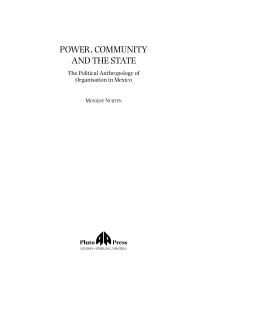
Additional Information
Book Details
Abstract
This book explores the balance of power between the state and local communities, with particular reference to societies in the developing world.
Monique Nuijten shows how rituals of bureaucratic power and accusations of corruption give flesh to incredible fantasies, and conspiracy theories among officials, peasants and brokers. At the same time she shows that in this labyrinthine world of bureaucratic obstacles and state control, local agrarian communities manage to find certain room for autonomy.
Drawing on her extensive fieldwork in Mexico, Nuijten draws wide conclusions that can be applied to many societies. Providing a detailed ethnography, she focuses on various themes, including a theoretical anthropology of state power; families and factionalism after agrarian reform; local organisation; questions of law; corruption; and development theory.
Table of Contents
| Section Title | Page | Action | Price |
|---|---|---|---|
| Contents | v | ||
| 1 AN ANTHROPOLOGY OF POWER AND THE STATE | 1 | ||
| Introduction: anthropology and the state | 1 | ||
| A study of state processes through peasant communities in Mexico | 4 | ||
| A fascination with power and conspiracy | 6 | ||
| Organising practices and force fields | 10 | ||
| Three dimensions of the state | 15 | ||
| The creation of a multi- sited, reflexive ethnography | 19 | ||
| 2 FACTIONALISM AND FAMILY AFTER THE AGRARIAN REFORM | 26 | ||
| Introduction: Cacicazgo and factionalism in Mexico | 26 | ||
| Agrarian struggle and land reform in the valley of Autlán | 27 | ||
| Land, power and party politics 32Ejidatarios and their landless neighbours | 34 | ||
| Land and local politics | 36 | ||
| A glimpse of present- day life in La Canoa | 41 | ||
| Factions and the kinship idiom 42Conclusion: a globalised situated community | 46 | ||
| 3 POLITICS AND LOCAL ORGANISATION | 48 | ||
| Introduction: organisation and organising practices | 48 | ||
| Ejido administration and the role of the commissioner | 49 | ||
| Meetings as arenas of bickering and indecisive confrontation | 51 | ||
| The force fields of ejido organising practices | 54 | ||
| The unpopularity of formal positions | 60 | ||
| Contrasting discourses of organisation | 63 | ||
| Conclusion: alternative forms of governance and accountability | 67 | ||
| 4 ILLEGALITY AND THE LAW | 70 | ||
| Introduction: a shadow world of illegal practices | 70 | ||
| A basic contradiction in the agrarian law | 71 | ||
| Migration and the renting out of land: a risky endeavour | 74 | ||
| The inheritance of land and the law | 77 | ||
| Organising practices within an illegal land market 82A famous land conflict in La Canoa | 84 | ||
| Conclusion: multiple force fields and the role of the law | 88 | ||
| 5 THE LOST LAND I: THE PRIEST AND THE LAWYER | 91 | ||
| Introduction: land conflicts and the idea of the state | 91 | ||
| Predicament of the conflict and obscure enemies | 93 | ||
| Story- telling, maps and murders | 97 | ||
| Resuming the fight against the Pequeños in 1991 | 99 | ||
| The struggle begins: licenciado Salazar 102More dealings with Salazar and growing doubts | 110 | ||
| Shifting constellations and individual frustrations 112Conclusion: the labyrinthine bureaucratic machine | 115 | ||
| 6 THE LOST LAND II: THE SURVEYORS | 119 | ||
| Introduction: the desiring machine | 119 | ||
| The SRA surveyor Serrano arriving in the village | 120 | ||
| A new broker: the gatekeeper in Mexico City | 124 | ||
| The priest visiting the head of the SRA in Guadalajara | 128 | ||
| The second surveyor: Castañeda 132Distrust, conspiracy and dealing with contradictory information | 136 | ||
| About maps and other hard data | 138 | ||
| The third surveyor to arrive at the ejido: Morales | 148 | ||
| 7 INSIDE THE HOPE- GENERATING MACHINE | 152 | ||
| Getting access to the bureaucratic lifeworld | 155 | ||
| Officials dealing with a politicised bureaucracy | 158 | ||
| A new institute and officials fighting corruption | 161 | ||
| Officials and ambiguous institutional environments | 164 | ||
| 8 DEVELOPMENT DISCOURSES AND PARTICIPATORY APPROACHES | 176 | ||
| Introduction: a top- down imposition of participation | 176 | ||
| Organisation and participation in the development debate | 176 | ||
| The IER programme in a new institutional environment | 179 | ||
| Intervention and rituals of resistance | 184 | ||
| The myth of the modern , accountable organisation | 189 | ||
| Conclusion: deconstructing the myths in the development debate | 191 | ||
| 9 CORRUPTION, ORDER AND THE IDEA OF THE STATE | 194 | ||
| Introduction: Power in multiple force fields | 194 | ||
| Fantasy and the culture of the state | 196 | ||
| The hope- generating machine and its dividing effects | 198 | ||
| Corruption and the underworld of rituals | 200 | ||
| The continuing importance of the idea of the state | 206 | ||
| Notes | 209 | ||
| References | 212 | ||
| Index | 221 | ||
| Abrams, P. | 10 |
